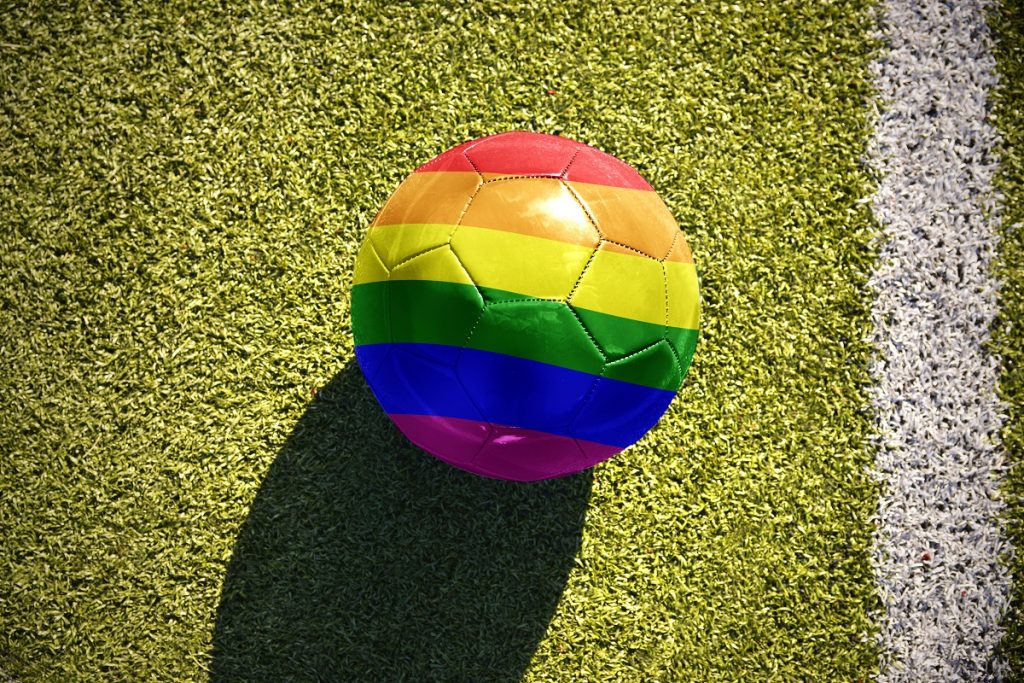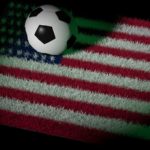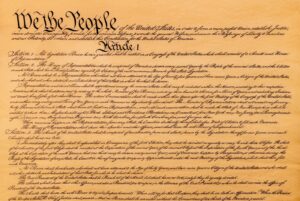Harassment of LGBT soccer players and fans is wrong. Now a new problem is emerging: harassment of conservative religious soccer players and fans by LGBT supporters. This too is wrong.
In 2018, as it did in 2017, US Soccer, the governing body for our Women’s and Men’s National Teams, is requiring players to wear special Pride Month jerseys with rainbow-colored player numbers for international play during June. Players called up to either National Team this month faced a choice of wearing the rainbow jersey or missing out on the rare and amazing opportunity to play for our country.
Again, harassment of LGBT players and fans at soccer venues is a real and serious problem. But now, as if that problem weren’t bad enough, as a result of controversy over these rainbow jerseys, LGBT-agenda supporters have chosen to become the harassers. They are targeting a player called up to the national team who refused to wear a rainbow-numbered jersey because of her faith.
The decision to require players to wear rainbow jerseys is provoking and inflaming harassment, not reducing it. Not only that, it also violates both the properly inclusive regulations governing international soccer and, it would seem, United States law.
Start your day with Public Discourse
Sign up and get our daily essays sent straight to your inbox.Hostility to Christians
As I wrote about in 2017, professional women’s soccer player Jaelene Hinkle declined a call-up to the US National Women’s Team because she did not want to be forced to wear the rainbow jersey celebrating Pride Month. At the time, Hinkle cited “personal reasons” for her decision. In a recent interview with the Christian Broadcasting Network (CBN), Hinkle stated explicitly that she made that 2017 decision due to her Christian faith: “I just felt so convicted in my spirit that it wasn’t my job to wear this jersey. And I gave myself three days to just seek and pray and determine what He was asking me to do in this situation.”
Hinkle now faces harassment on the soccer field. At the May 30, 2018, game at which Hinkle played for the North Carolina Courage against the Portland Thorns, fans harassed Hinkle because of her refusal to wear the rainbow-numbered jersey. When she entered the field and during the game, fans booed Hinkle. Some held up a sign mocking her with “personal reasons” in rainbow letters. In the highlights video of the game, as Hinkle appears, the commentator observes that at this game Hinkle is “coming into a hostile environment” (at 01:49).
Astonishingly, Jim Buzinski, writing at the online journal Outsport, justified this harassment of Hinkle. In his view, “She is not being persecuted and is able to play pro soccer. Her skipping a chance to play for the USWNT is her choice and right, and fans who disagree by booing and making signs addressing her views have the same rights.” Yes, the fans have freedom of speech, but this does not make harassing speech directed at a player for her religious and political views acceptable.
The CBN headline about the Hinkle interview explains, “Controversial Decision Threatens Budding Soccer Career.” Why should a soccer player face a choice between her career and wearing a Pride Month jersey? Why should the willingness to wear a Pride Month rainbow jersey be the measure for deciding which athletes represent America in the arena of international sports? It is time to challenge these US Pride Month rainbow jerseys as a violation of the international laws of soccer, if not also US law too.
The Laws of the Game—and of the United States
The authority responsible for determining the rules of world soccer is the International Football Association Board (IFAB), established in 1886. The much more well-known overall organizing body for soccer, FIFA, which was established in 1904, recognizes IFAB’s “Laws of the Game” as the authoritative source for soccer rules. FIFA’s slogan is “For the Game. For the World.” The IFAB regulations followed by FIFA reflect this inclusive spirit that soccer is for the world, not just for those who accept a particular political agenda.
The 2018/2019 edition of IFAB “Laws of the Game” states in Law 4, Section 5: “Equipment must not have any political, religious or personal slogans, statements or images.” The section then elaborates on the “Principles” of the law and includes guidance on “Interpreting the Law.” The “Principles” include a statement that “Law 4 applies to all equipment (including clothing) worn by players” and that “Permitted slogans, statements or images should be confined to the shirt front and/or armband,” though “In some cases, the slogan, statement or image might only appear on the captain’s armband.”
So, for starters, the use of the number on the back to express “slogans, statements or images” is not allowed. But much more serious is the way the jersey rainbow numbers violate the IFAB’s interpretation guidelines, which state that “slogans, statements or images related to the following are not permitted:
- any local, regional, national or international political party/organisation/group, etc…
- any specific political act/event
The rainbow today is the symbol of a political movement. It seems plausible that the “etc.” above would extend “political party/organization/group” to include “movement.” Moreover, in the US Pride Month is arguably a “political event.”
And certainly, US Pride Month is at a minimum a “significant national event.” From professional sports games to major corporate events, rainbows abound this month. IFAB guides state that “When commemorating a significant national or international event,” interpretation of Law 4, Section 5 entails that “the sensibilities of the opposing team (including its supporters) and the general public should be carefully considered.” Regarding “the sensibilities of . . . the general public,” there can be no doubt that in America today sexual politics are highly controversial and divisive.
IFAB further explains, “Any slogan, statement or image” that involves “gesturing in a provocative, derisory or inflammatory way” is prohibited. Although the rainbow is not a gesture, in today’s highly contested socio-political environment, it has certainly become “provocative” and “inflammatory.” And this comes at a time when the very last thing we need in our tense political situation is provocation or inflammation.
IFAB’s list of prohibitions continues, “Competition rules may contain further restrictions/limitations, particularly in relation to the size, number and position of permitted slogans, statements and images.” It would be fully in accord with the IFAB “Laws of the Game” for FIFA to disallow use of the political rainbow on national team jerseys.
Moreover, under US law, the insistence of US Soccer that players are required to wear these rainbow jerseys is questionable. According to the Ted Stevens Olympic and Amateur Sports Act, “An amateur sports organization,” such as the US Soccer Federation, “is eligible to be recognized, or to continue to be recognized, as a national governing body only if it . . . provides an equal opportunity to amateur athletes, coaches, trainers, managers, administrators, and officials to participate in amateur athletic competition, without discrimination on the basis of race, color, religion, sex, age, or national origin.” US Soccer has an obligation to give all players, including religious believers, a fair chance to play. Requiring an ideological test—a statement of faith in support of LGBT rights—to make the team fails to provide such a fair and inclusive opportunity.
Make Sport Everyone’s Game
Adding the rainbow symbol to soccer kits is so provocative and inflammatory that Russia even complained about the EA Sports FIFA 2017 soccer video game, in which players could opt for a rainbow kit for virtual play. Video game players opposed to the political agenda of the rainbow symbol have also protested the FIFA 2017 video game.
It is important to recognize that there are reasons for inclusivity efforts such as the Stonewall Rainbow Laces Campaign. The slogan of this campaign, which seeks to get soccer players to use rainbow colored laces for their cleats, is “Make sport everyone’s game.” I couldn’t agree more. I applaud the Stonewall Rainbow Laces Campaign video. It provides important information about how crass and cruel the anti-LGBT slurs are at soccer games and how unwelcome LGBT players and fans feel in some soccer settings. No one deserves to be treated this way. But in the effort to “Make sport everyone’s game,” everyone must mean everyone. Soccer should not become the narrow purview of those with a particular agenda of sexual politics. Players such as Jaelene Hinkle should not be harassed, nor should they be required to violate their conscience in order to wear the kit of their national team.
The priorities of IFAB include “fairness, universality and inclusion.” This is precisely the spirit we need in soccer, which is both a global sport, and a vital realm of shared civic engagement. The Introduction to the Laws of the Game calls fairness “a crucial foundation of the beauty of the ‘beautiful game.’” Every qualified player should have a fair opportunity to play, without being required to accept a specific political or religious agenda. IFAB states unequivocally that
The Laws must also encourage participation from everyone, regardless of background or ability . . . The Laws must help make the game attractive and enjoyable so people, regardless of age, race, religion, culture, ethnicity, gender, sexual orientation, disability etc. want to take part and enjoy their involvement with football.
The Laws of the Game for soccer protect players such as Jaelene Hinkle from exclusion due to their religion. FIFA needs to apply these laws and see to it that US Soccer does too.
FIFA’s and others’ efforts to combat derogatory treatment of LGBT soccer players, staff, and fans are important and, sadly, needed. No one should be harassed. But those designing efforts to end harassment must be careful not to overreach and end up fostering exclusion, provocation, inflammation, and even harassment itself, in the name of “inclusion.” Instead, “Make sport” genuinely “everyone’s game.”














